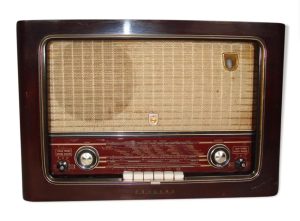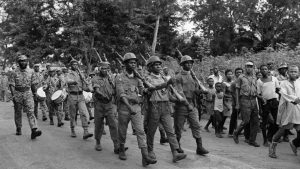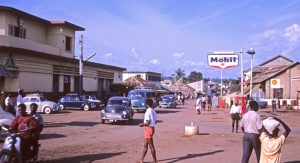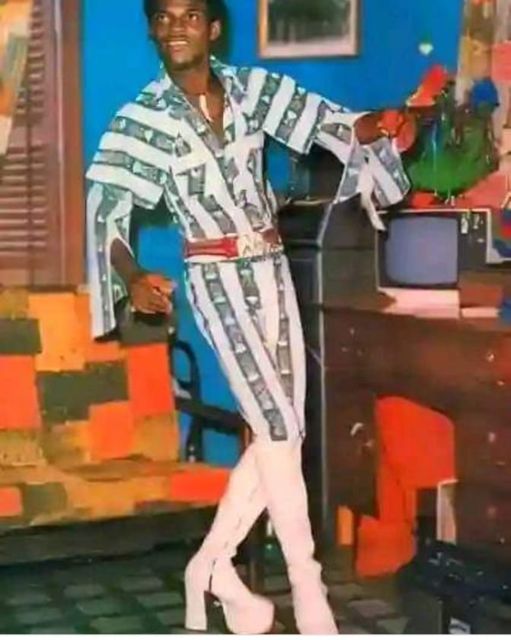The Nigerian Music Icon: Prince Nico Mbarga
THE STORY OF PRINCE NICO MBARGA, a boy who made a living by playing music every Sunday night at Onitsha Plaza Hotel, is one you may not have encountered in history. There is probably no street or building named after him. And when Nigerians list the legends of this country, Nico’s name doesn’t make the cut. But on the board of the most sold singles in the world (1998) – where Elton John’s Candle In The Wind, Celine Dion’s My Heart Goes On, etc., were captured – only one African, with over 13 million copies sold, made the list. His name was Nico Mbarga.
You see, Nico was the child of a Cameroonian father and a Nigerian woman from Mbembe (Obubra LGA, Cross Rivers State.)
He was born and raised in Ikom – present-day Cross River State. He started fishing as a boy, and his father, who sawed timber, was a nice man. He bought his boy a secondhand Philip Radio, and the boy became addicted to highlife music. He couldn’t stop listening to Bobby Benson’s ‘Taxi Driver.’ But the death of his father when he was still too tender made his mother, a peasant farmer, the sole breadwinner.

Love Against the Odds: Nico and Lucy
The mother suffered a lot, but the boy wasn’t a prodigal. He moved from one bar to the other doing what he loved – singing. Sometimes he got a little pay, others didn’t pay at all. At his 17th year, the Nigerian – Biafra war broke out. And while his mother stayed back in Nigeria, Nico found his way to Mamfe – Cameroon. That’s where he met Lucy. The article said that both lovers were so poor they couldn’t afford a pot of boiling water. But Lucy married Nico anyways.
It’s 1970. The Biafran War comes to an end, and Nico and Lucy – without a penny to their names, or passports – traverse “the bush way” to make it back to Nigeria, settling in Onitsha, a trading down on the Niger River. And oh, what a town Onitsha would be for them.

Onitsha: The Town of Opportunities
Onitsha was booming, literally. And it was there that God blessed Nico. He became a darling of the town. He built a band named Rocafil Jazz. There, EMI – a record company, signed Nico and Rocafil Jazz. In 1971, Nico released his first song, ‘I No Go Marry My Papa’ – inspired by his wife, Lucy. The song helped him to build his brand, and he remembered that there was one song that was in his memory. The words were: ‘Sweet Mother, I no go forget you, for this suffer you suffer for me…’

The EMI Connection and ‘I No Go Marry My Papa’
But EMI record that liked the song initially later thought that it was childish and didn’t produce it. But Sweet Mother wasn’t just a song to Nico; it was his life, his autobiography. So, wherever he went with his band, he sang the song. It was while he was singing the song at a joint that an Onitsha Independent Record owner, Romanus Okonkwo of Rogers All Star, heard the song, and that encounter led to Nico breaking off from EMI.
Romanus Okonkwo would produce ‘Sweet Mother’ and release it through his fledging label. It was an instant hit. The story had it that the song became an anthem. It got every Nigerian to their feet, belting ‘Sweet Mother’ at the top of their lungs.
The song took them to Ghana, Togo, Kenya. Nico became larger than the Nigerian Market. They even went on a London Tour. But you see, the fame and money – as recorded – came too fast for Rocafil Jazz. The band fell apart, made up, then folded up and never made any music together again.
But in Rocafil’s prime – and the years thereafter – “Sweet Mother” – with the bite of pirated copies – sold more than 13 million copies. Yes, Prince Nico Mbarga’s “Sweet Mother” has sold more copies than “Macarena.” And even The Beatles’ “I Want to Hold Your Hand.”
The Tragic End: Nico Mbarga’s Untimely Death
But the story has not ended. I have not told you what became of Prince Nico Mbarga and his sweet Mother. According to the article by David Zabinsky: On the way to Ikom probably to see ‘Sweet Mother,’ Nico’s car ran out of petrol. So he hailed down an okada: a local motorbike. But an accident sent Nico flying. He hit his head. Badly. Nico died two weeks later in the hospital. Never able to play “Sweet Mother” one last time. Or say goodbye.
Back in Ikom, when Nico’s mother – now elderly – heard the news, she fell in shock. She’d never get back up, either. She died shortly after.
And we can only hope, just as Nico would have wanted it… That his mother had “Sweet Mother” playing on that secondhand Phillips radio right beside her on her deathbed… Hearing her son sing one last time: “Sweet mother, I no go forget you… Sweet mother, I no go forget you.
The Nigerian Music Icon: Prince Nico Mbarga







